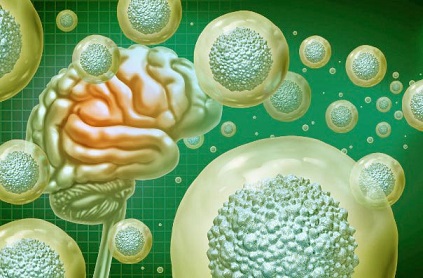Nikhil Prasad Fact checked by:Thailand Medical News Team Aug 07, 2024 1 year, 5 months, 5 days, 7 hours, 47 minutes ago
Stem Cell News: Researchers have uncovered the remarkable neuroprotective and anti-inflammatory properties of proteins secreted by glial progenitor cells derived from human induced pluripotent stem cells (iPSCs). This groundbreaking study, conducted by a team from multiple esteemed institutions in Russia, sheds light on potential new treatments for a range of neurological diseases.
 Stem cells show promise in combating brain inflammation and neuronal damage
The Promise of Stem Cells
Stem cells show promise in combating brain inflammation and neuronal damage
The Promise of Stem Cells
Stem cell technology has long been hailed as a promising avenue in regenerative medicine. By using stem/progenitor cells to repair or replace damaged tissues, scientists have explored treatments for cardiovascular diseases, neurological conditions, and various injuries. However, cell transplantation has its own set of challenges, including immune rejection and transportation difficulties. This
Stem Cell News delves into the exciting new research focused on the therapeutic benefits of secreted proteins from glial progenitor cells, potentially overcoming these challenges.
Secreted Proteins: A New Frontier
The study explored the effects of proteins secreted by glial progenitor cells (SP-GPCs) on inflammation and neuronal damage. Glial progenitor cells, derived from human iPSCs, have shown significant promise in reducing inflammation and protecting neurons from damage. These proteins, with a molecular weight below 100 kDa, were tested for their ability to mitigate inflammation and promote neuron survival. The research suggests that using only the secreted factors from these cells might offer a more effective and safer therapeutic approach.
Combatting Inflammation
Inflammation is a common feature of many neurological diseases, often exacerbating the damage caused by excess glutamate - a key neurotransmitter in the brain. In excess, glutamate can lead to the destruction of neurons, a process known as excitotoxicity. This study revealed that SP-GPCs effectively reduced inflammation in a primary glial culture model of LPS-induced inflammation by inhibiting nitric oxide (NO) production through the suppression of inducible NO synthase (iNOS).
How Inflammation Affects the Brain
When the brain experiences inflammation, cells like microglia and astrocytes release cytokines, interleukins, and other molecules that can worsen neuronal damage. NO, synthesized by iNOS, plays a dual role - while it can be protective in small amounts, excessive NO contributes to oxidative stress and cell damage. This is particularly relevant in diseases like Alzheimer’s, Parkinson’s, and multiple sclerosis, where chronic inflammation is a key pathological feature.
Protecting Neurons
One of the critical findings was the ability of SP-GPCs to neutralize the harmful effects of glutamate, increasing the number of viable neurons to control levels. This protective effect was attributed to a decrease in intracellular calcium levels, which, w
hen elevated, trigger neuronal death. Additionally, SP-GPCs helped maintain mitochondrial health, further enhancing neuron survival.
The Role of Glutamate in Neuronal Damage
Glutamate is crucial for normal brain function, facilitating communication between neurons. However, when its levels become excessively high, it overactivates receptors like NMDA, leading to an influx of calcium ions into neurons. This excessive calcium disrupts cellular function, damages mitochondria, and triggers cell death pathways. The ability of SP-GPCs to modulate calcium levels and protect mitochondrial function is a significant finding in preventing neuronal loss.
Detailed Study Findings
The research team, led by scientists from the Laboratory of Cellular Biotechnology at RUDN University-Russia, the Research Centre for Medical Genetics-Moscow, and the National Medical Research Center for Children’s Health-Moscow, conducted rigorous experiments to validate these findings. They used a variety of models to test the anti-inflammatory and neuroprotective properties of SP-GPCs.
-Reduction in NO Production
The study demonstrated that SP-GPCs reduced NO production in glial cultures treated with LPS, indicating a potent anti-inflammatory effect. The concentrations of SP-GPCs tested (15 and 45 µg/ml) were effective in decreasing NO secretion by astrocytes and microglia. This reduction in NO is crucial as it mitigates the oxidative stress and subsequent damage that NO can cause in neurons.
Inhibition of iNOS.
SP-GPCs significantly lowered the number of iNOS-positive cells in the LPS-induced inflammation model. This effect suggests that SP-GPCs can modulate inflammatory responses at the cellular level, providing a dual benefit of reducing inflammation and protecting neurons from its detrimental effects.
Neuronal Viability
In a model of glutamate excitotoxicity, SP-GPCs improved neuronal survival, matching the effectiveness of memantine, a well-known NMDA receptor antagonist. This indicates a potential therapeutic application for conditions involving glutamate-induced neuronal damage. By preventing the excessive calcium influx and stabilizing mitochondrial function, SP-GPCs enhance the resilience of neurons to toxic insults.
Mitochondrial Stability
SP-GPCs maintained higher mitochondrial membrane potential and NADH levels in neurons, crucial for cellular energy production and survival under stress conditions. Healthy mitochondria are vital for neuron function, as they generate the energy needed for cellular processes and help regulate intracellular calcium levels.
Conclusion
This study highlights the potential of SP-GPCs in developing new treatments for neurological diseases characterized by inflammation and neuronal damage. By reducing inflammation and protecting neurons, SP-GPCs could pave the way for innovative therapies that improve patient outcomes. The ability to use secreted proteins from glial progenitor cells offers a promising alternative to direct cell transplantation, potentially avoiding complications like immune rejection.
The study findings were published in the peer-reviewed journal: Frontiers in Cellular Neuroscience.
https://www.frontiersin.org/journals/cellular-neuroscience/articles/10.3389/fncel.2024.1449063/full
For the latest
Stem Cell News, keep on logging to Thailand Medical News.
Read Also:
https://www.thailandmedical.news/news/new-stem-cell-therapy-shows-promise-for-alcohol-induced-liver-damage
https://www.thailandmedical.news/news/breaking-canadian-study-finds-that-stem-cells-blood-transfusions-and-tissue-transplants-can-transmit-alzheimer-s-disease
